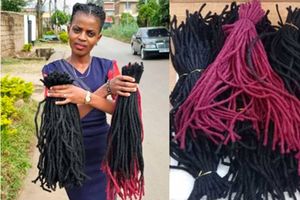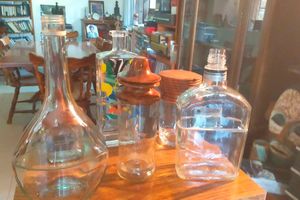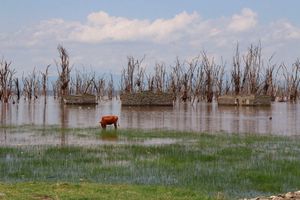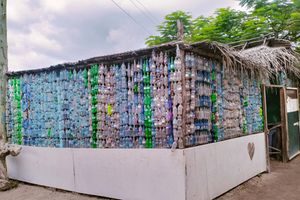
Paul Ndung'u on April 9, 2025 stands beside a wall constructed using recycled bottles.
At the heart of the vast, untamed wilderness of the Maasai Mara National Reserve, where lions roam free and sunsets burn golden over acacia trees, a quiet revolution is taking place. It's not in the savannah or among the wildlife, but behind the walls of a luxury hotel where trash is being turned into treasure and yesterday's leftovers are feeding tomorrow's possibilities.
Just 400 metres from the front desk of the JW Marriott Hotel, Paul Ndung'u, 30, is hard at work in a sustainability centre set up by the hotel to manage food waste and turn it into useful products.
Leftover food
One standout initiative involves using leftover food to breed black soldier flies, specifically larvae, which are later processed into poultry feed. This approach not only minimises waste, but also supports sustainable animal farming.
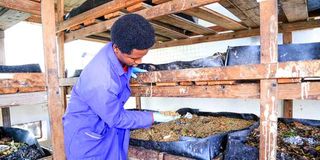
Paul Ndung'u checks on the animal feed made from dried larvae at Maasai Mara on April 9, 2025.
To successfully obtain these larvae, there are five steps that help the process to succeed. The first step is to allow the flies to lay eggs, which are then kept for several days until they hatch into small larvae that are placed in the waste.
“These insects have a very short lifespan. After 10 days, they die. So, to ensure the process continues, we make sure they lay eggs, some of which we allow to become adult flies, while others are used to consume the waste,” Ndung’u says.
He points out that the mature larvae, which are used to make animal feed or consumed by humans, are dried using solar energy before being packaged.
“Our market is in Kiambu and Kakamega counties. There are traders who use them to make animal feed. After two weeks, we have about 200 kilogrammes, and one kilo sells for between Sh100 and Sh120.”

Paul Ndung'u on April 9, 2025 explains how the dried larvae are used as animal feeds at Maasai Mara.
Ndung’u says that some of the consumers of the larvae are people keen on building muscle. “These larvae are excellent because they help with body development.”
From glass to sand
The hub also reuses glass bottles from the hotel. Instead of being dumped, the bottles are crushed and turned into sand, which is then used in construction. This recycled sand is ideal for making floor tiles, flower vases and fence posts, and even for building houses. Such houses require significantly less cement to fill the gaps during construction, reducing overall costs and environmental impact.
At the sustainability centre, Ndung'u also spends time turning glass bottles into various animal sculptures, which are sold to tourists visiting the restaurant.
“As you can see, these sculptures are made from bottles, then we paint them. We usually crush the bottles. The next step is turning the crushed material into a paste. Then we use it to create the sculptures,” Ndung’u explains.

A collection of bottles set to be transformed into valuable items in this photo taken on April 9, 2025.
He says that the sculptures are sold at different prices. The difference in prices depends on the local prices and those offered to foreign tourists.
“There are some sculptures that we sell at Sh600 to foreign tourists. In the local market, we sell the same sculptures for Sh400,” Ndung’u adds.
The crushed glass is also used to make flooring, which helps to reduce environmental pollution for the community living near the Maasai Mara Reserve. The glass bottles, which take a long time to decompose and are difficult to dispose of properly, have now become a solution for the community.
“Many times, residents don’t know where to dispose of glass waste. But thanks to this innovation, these bottles can be used in house construction. If arranged well, they can form walls although one would need a bit of cement. Also, in various restaurants or homes, there’s a great opportunity to use them to build sinks,” Ndung’u says.
A hub of hope
The sustainability hub, established at the reserve a year ago, has grown significantly.
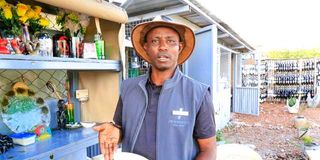
Mr Fairman Muhingi, Logde manager at JW Marriot, Maasai Mara, displays one of the end products in this photo taken on April 9, 2025.
JW Marriott's Maasai Mara Lodge Manager, Fairman Muhingi, says progress has been made in reusing various types of waste, including bottles and paper.
Mr Muhingi adds that the hub has become a source of employment, providing job opportunities for locals to assist in the day-to-day operations.
“The sustainability hub was created to address the major challenge of waste in the hospitality industry, not just for JW Marriott but for all hotels operating in the Maasai Mara. We wanted to come up with a solution that turns waste into something useful,” he says.
“I encourage all hotel operators to adopt similar waste management systems. By working together, we can create a functional and sustainable ecosystem that benefits the environment and ensures a better future. We are looking at scaling up this initiative to not only manage waste but also support local communities where we operate.”

